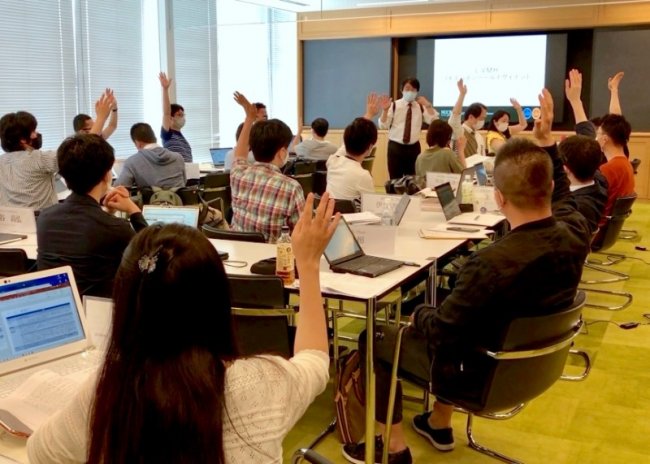On Saturday, September 26, 2020, the fall semester began at NUCB Business School, and face-to-face classes resumed. From the perspective of social distance, the EMBA course at the Tokyo Campus started with two classes at the same time, and the distance between the seats was doubled to prevent the new coronavirus.
This course is designed to develop logical thinking skills, which are the basis for "thinking and communicating" in market analysis, planning proposals, and presentations. In particular, the course focuses on strategy and strategic thinking, which are the most necessary aspects of logical thinking. At the same time, for newly enrolled students, the course is positioned as an introductory lecture for future lectures, and aims to learn how to use case studies as a basis for learning in the courses to come. There are various definitions of strategy, but I will define it as "strategy = winning the competition." In order to win the competition, you need to know the battlefield (the market), know the enemy (the competition), know your own strength (your company), and then formulate an appropriate strategy to start fighting (execution). Theories and methods of strategy support this series of actions. In this course, while learning the basics of theories and methods, the main goal is to learn and acquire the more important "strategic thinking and ideas" and to build a foundation of logical thinking. In this course, students will learn the basics of theories and methods, but will also learn the more important "strategic thinking and ideas" in depth.
The third day's lesson was a case study of the competition between Pepsi-Cola, which has been challenging Coca-Cola for 100 years, and Coca-Cola, which has been expanding in response. In this course, we will analyze the strategic perspectives and competitive strategies of the two companies and derive the "principles of competition. In particular, the class discussion will start with understanding the business model of manufacturing and selling "cola" by focusing on the profit margins of undiluted manufacturers and bottlers. Then, encouraged by Professor Yuji Nagasawa's facilitation, the students raised their hands one after another to delve deeper into the strategies of Coca-Cola and Pepsi-Cola by sorting out the axes of competition (points of confrontation) and unraveling what measures each company was taking in relation to its competitors. More than half of the students in this class were new students who had just enrolled in the school in September, so they were drawn to the energy of Professor Yuji Nagasawa and their classmates, and enjoyed the heated discussions despite their nervousness.

 Brochure
Brochure
 Info Session
Info Session
 Application
Application
 Alumni Voices
Alumni Voices












